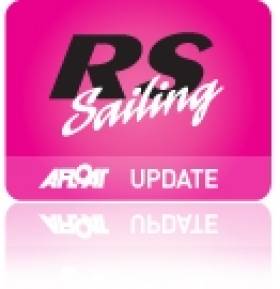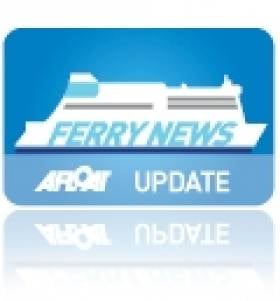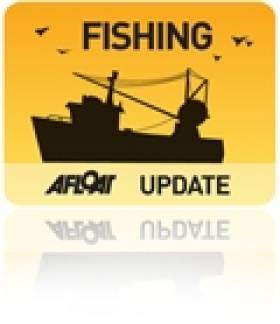Displaying items by tag: fleet
RS200/400 Demo at Royal St George Next Weekend
#RS SAILING - UK RS Association chairman Pete Vincent will be running another RS200 and 400 demo day from the Royal St George Yacht Club on the weekend of 24-25 March.
The well-known expert on RS boats is being brought to Dublin by RS400 owners Richard Tate and Emmet Ryan, who are "really keen to get an RS fleet up and running" in Dun Laoghaire.
"After the huge attention our boats have drawn both ashore and on the water, we feel there is already a keen interest from a broad cross section of sailors to learn something more about these incredible hiking dinghies," says Tate.
"There is a ready-to-race format for both RS200s and 400s to have a full season of racing every Tuesday and Thursday in Dublin Bay right from the go."
The RS200 is described as a "natural progression" from the RS Feva, while the RS400 "takes the concept one step further and way beyond". Both classes provide high performance assymmetrical racing for all age groups.
If you are thinking about moving into an RS200 or 400, this is the perfect opportunity to help you make your decision.
All demo sails must be booked in advance by contacting Pete Vincent directly at +44 7812 899 043 or [email protected].
#FERRY NEWS - A cross-border project to develop ferry services for island and remote communities of the Irish and Scottish coastlines has received funding in the sixth round of the European Regional Development Fund (EDRF).
A grant of £450,000 (€540,000) has been allocated to procure the world's first ever hybrid RORO ferry for operation in Scotland, following the completion of the INTERREG funded Small Ferries Project.
The project - a cross-border partnership between Caledonian Maritime Assets Limited and administrations in Ireland and Northern Ireland - produced common designs and procurement strategies for a fleet of small ferries which could be used to serve remote coastal communities.
As previously reported on Afloat.ie, five Scottish coastal routes (and three Irish routes) were examined as part of the Small Ferries Project report published in September last year.
Arising from this, Scotland will see the next step in the project by hosting the world’s first hybrid RORO ferry, designed for use on short crossing routes around the Clyde esturary and Hebrides.
The EDRF funding will also be used to develop the corresponding shore infrastructure to enable the ferry to recharge in port.
The first vessel is expected to enter service in Spring 2013.
Grant Aid Announced for 129 Fisheries Projects
Grant-aid of €1,122,084 is being provided to support a total investment of €2,023,127 for safety upgrades on board fishing vessels, lobster conservation, the development of Environmental Management Systems for Ireland's fishing fleet, and a number of collectively based projects under the new Marine Environment Protection Scheme (MEPS).
"These projects will further support our fishing industry", said Minister Connick. "Based as they are on the principle of responsible fishing practices that result in premium quality Irish seafood, the environmental focus for many of these projects will be critical in sustaining Ireland's fisheries sector during this time of unprecedented economic challenge".
A range of marine environment, conservation and safety initiatives are approved. Jointly developed by the industry and Bord Iascaigh Mhara, the Seafood Environmental Management System (sEMS) and the Marine Environment Protection Scheme (MEPS), respond to the growing demand by seafood providers and consumers for access to responsibly sourced wild caught fish. Included is grant-aid of over €350,000 to assist Irish fishing vessels develop and implement Environmental Management Systems as well as undergoing third-party accreditation for the newly developed BIM Stewardship Standard. This internationally accredited (ISO65 – EN45011) standard is amongst the first of its kind worldwide. Ireland led the way with the introduction of the first such scheme for salmon in 2005 and since then has developed similar schemes for mussels and oysters.
BIM will also roll out the €419,000 Marine Environment Protection Measure, a programme aimed to maintain healthy fish stocks while simultaneously developing the marine environment. The national lobster conservation programme is also funded to the tune of €113,000 with a similar investment being made by inshore fishermen.
A full list of all the projects funded is provided below.
Sea Fisheries Development Programme
Fisheries Operational Programme – European Fisheries Fund
|
SCHEME |
Projects Approved |
Investment |
Total Grant Aid |
|
Marine Environment Protection Measure*
|
8 |
€477,366 |
€418,902 |
|
SEAFOOD ENVIRONMENTAL MANAGEMENT & CERTIFICATION GRANT AID SCHEME*
|
7 |
€740,117 |
€350,073 |
|
Shellfish Discard & Live Return Reduction scheme - Lobster conservation* |
42 |
€205,680 |
€113,124 |
|
FLEET SAFETY SCHEME
|
70 |
€483,936 |
€193,574 |
|
MARINE TOURISM SAFETY SCHEME
|
2 |
€116,029 |
€46,411 |
|
TOTAL |
129 |
€2,023,127 |
€1,122,084 |































































